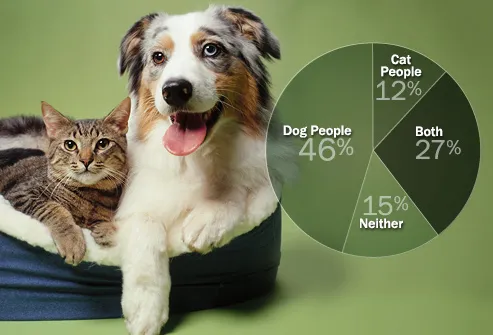Cats or Dogs? I am sure we’ve all been asked the age old question one too many times. The cliche question is commonly posed in icebreaker activities, sparking an interesting discussion into the reasoning behind people’s preferences. Interestingly enough, the question seems to result in a one sided answer, with most people preferring one over the other. The Humane Society of the US reports that 65% of American households own a cat or dog. With that being said, it’s no surprise that many Americans today either distinguish themselves as a “cat” or “dog” person. The label may be derived from childhood experiences, current or past pet ownership, or simply a self proclaimed title constructed by the media or a friends experience with these pets. According to a poll conducted by the associated press, 74% of participants claimed to favor dogs more, while only 41% felt passionately about cats. Notably, there have been multiple scientific studies examining the differences in personality and physical appearances between cat and dog lovers.

In a web based study published by Sam Gosling, a psychologist at the University of Texas, 4,565 participants were initially asked if they identify themselves as a cat or dog person, neither, or both. They were then asked to complete a 44 question assessment that sought to examine the “Big Five” personality dimensions that psychologists use to study human personalities. These broad personality domains include extraversion, conscientiousness, agreeableness, neuroticism, and openness to experience.
It was found that on average, dog lovers were 15% more extroverted and 13% more agreeable. These statistics coincide with the fact that dogs are naturally more sociable and “people person” oriented than cats are. Additionally, those who favor dogs tested 11% more conscientious (being able to display self discipline and aim for personal achievement) than cat lovers. This can probably be accredited to the fact that dogs are more easily taught commands and tasks than cats are.
Cat people tested much differently on the personality scale, they were found to be 12% more neurotic, meaning they are emotionally unstable. On the other hand, cat people were 11% more open than dog people, meaning they hold a greater appreciation for worldly concepts such as art and emotion, and possess a stronger sense of imagination than their counterpart. These people were likely to hold unconventional and unusual beliefs, straying from traditional, cliche interests.
Overall, dog owners were found to be more social and accepting than cat owners, who tend to be introverted and keep to themselves. Interestingly enough, Sam Gosling, a psychologist at the University of Texas in Austin and head researcher in this study, has come to illustrate the major differences in cat and dog owners in a single comparison. Gosling asked pet owners, “If you had adequate living space and there were no objections from other people in your life, and someone gave you a puppy as a gift, would you keep it?” The responses of cat and dog people were analyzed, and it was found that two thirds of exclusive cat owners said they would not accept the gift, while 70% of dog owners said they would welcome a cat into their household.
Personally, I am not surprised by these statistics. It’s understandable that dog owners, who were in general found to be more agreeable and easy going, would accept a cat into their household. On the other hand, cat owners would be hesitant to welcome a rowdy dog into their house due to their more introverted and sedated personality traits.
Multiple studies have been conducted that attempt to uncover the personality differences between cat and dog owners, and findings have been similar across the board. Another article I stumbled upon talked about a study conducted of 600 college aged students. Similar to the initial study I analyzed, dog owners were found to be more lively, seek companionship, possess a more dominant personality, and distinguish themselves as “people persons.” On the contrary, cat owners were found to be smart, open minded, seek affection, and prefer solitude.

Who would have thought that one’s choice in household pet could say so much about their personality? Overall, it can be agreed upon that personality traits can be partially determined through an individual’s affinity to either a cat or dog.

I am definitely a dog person. I have always had a dog in my life and I think they have wonderful personalities. I never actually thought about cat vs. dog owners having different personalities. lThis article I found also saying there are differences between “purebred” owners and “mutt” owners. It is also interesting that dog owners are so much more likely to accept a cat in their household, than a cat owner would accept a dog. I wonder what fish or hamster owner personalities are like.
This post seems so true. Personally, I’m a dog person and I would agree that the traits parallel to dog lovers hold true. I also think this could be because dogs are often given the traits of being playful and outgoing whereas cats are more quiet and keep to themselves. I also like Rory’s comment on this post about animals shaping our personalities when we are exposed to them at a young age. That would be another interesting question to research. Great job!
One of my earliest memories involved a few of my first family dog. At the time, I really had no choice over what sort of animal that we could get–as I was just a toddler at the time. With this in mind, do you think that it’s possible that our animals shape our personalities, and not the other way around. Surely, some people may be prone to like a specific pet more than another, but perhaps that behavior is conditioned? Very interesting article content!